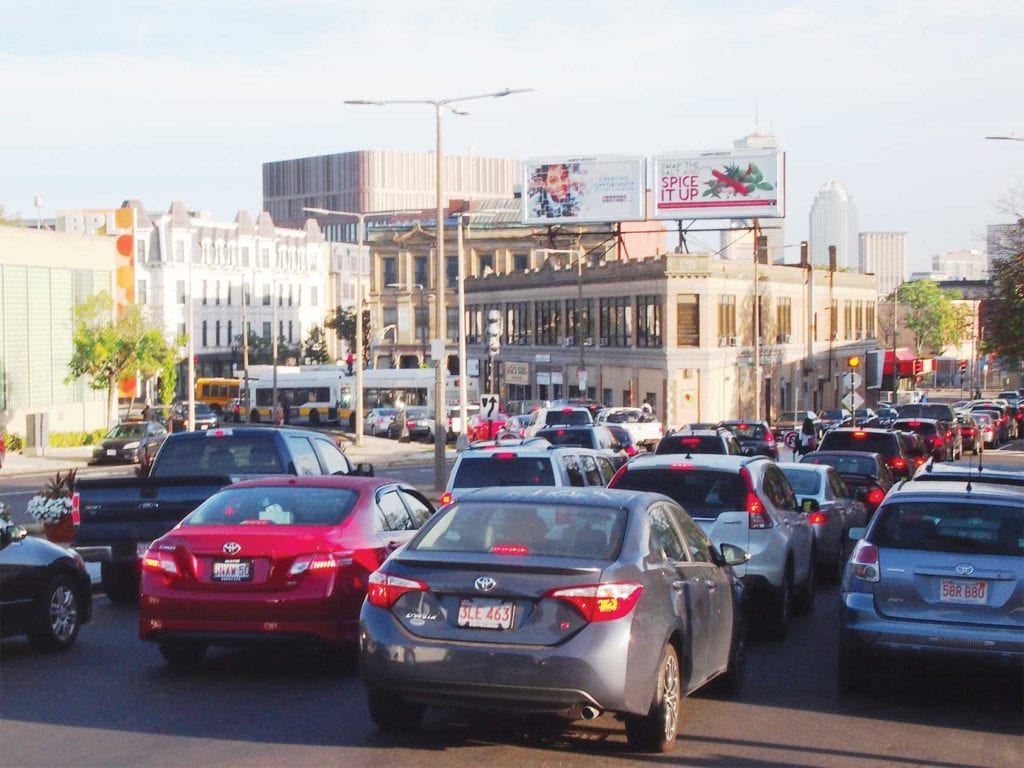
At a City Council hearing on March 19, Boston’s Office of Small Business Development revealed that Grove Hall has the highest rate of empty storefronts in the city. But it isn’t due to businesses folding during the pandemic.
Though consumers were staying home over the past year instead of frequenting local stores, some neighborhoods saw little change. In Grove Hall, Egleston Square and other neighborhoods with diverse populations, vacancy has occurred because of a gap in opportunity. Ed Gaskin, executive director of Greater Grove Hall Main Streets, has seen just one business in his neighborhood shut down during the pandemic.
“We were never part of the larger Boston economy,” Gaskin told the Banner. “Do you know when we felt the effects of COVID? It was when the governor mandated all businesses shut down, when my barbershops and beauty salons were mandated to shut down,” he said.
To him, the pandemic revealed how Black neighborhoods are segregated from Boston’s white economy.
Businesses in the area say they consistently deal with spaces being too expensive. Land owners, Gaskin says, often buy old buildings and don’t update them, making money as the properties appreciate in value. And businesses that can afford these rents are usually chains, not small, local outfits.
That’s why at-large Councilor Julia Mejia organized the hearing on commercial vacancies.
“We’re in a situation where it’s incredibly hard for people to access brick-and-mortar storefronts,” the councilor said.
The Office of Small Business Development presented self-reported data from each of the city’s Main Streets organizations, and while self-reported data is not 100% accurate, a representative said that it reflects what the business owners see.
“It was really hard to connect with business owners, as well as landlords, during the initial phases of COVID-19 … but it is reflective of what we’re seeing as you walk through the neighborhood — shutters are closed, doors are locked, lights are off,” said Natalia Urtubey, director of Small Business Development.
While the average vacancy rate for all spaces has been declining over the past four years, office space vacancies have been on a steady rise since June 2020, Urtubey said. Self-reported data puts Greater Grove hall at nearly 20% vacant, Hyde Park and Mission Hill at about 8%, and Egleston Square and Greater Ashmont at about 5%. In Jamaica Plain Centre, Allston Village, West Roxbury and East Boston, vacancy rates are much lower.
Besides the barriers of price that reinforce these vacancies, personal finance is an issue for many businesses. Some businesses are unbanked, don’t have printers to print out forms, or aren’t the best loan candidates. Gaskin says the blame isn’t all on businesses for this phenomenon.
Many businesses prefer to stay cash-only or use WhatsApp to communicate with business associates instead of email. Government assistance programs don’t always address the digital divide that’s been highlighted by the need for more online access to small businesses like restaurants.
Though the city’s Small Business Development office provides technical help through business assistants, who may offer free services to qualified firms and assist with federal Paycheck Protection Program loans, marketing and more, Gaskin says more outreach is needed.
“When it comes time to do PPP and you need financial statements, and you’re saying I need to pay somebody to [help] put my taxes together, I may not have the money to do that,” he said. “That becomes a barrier.”
Black businesses had a harder time getting the first round of PPP loans. According to a July study by Amplify Latinx, 71% of PPP loans were approved for Black businesses, compared to white businesses at 81%.
As the neighborhood recovers, Grove Hall will have one commercial vacancy filled this summer, when Grove Hall Creamery opens for business. Domingo Montiero is retiring from his job as a police officer to start his ice cream business on Blue Hill Avenue. After signing a lease a year ago, Montiero was worried that the usual difficulty of opening a business would be made worse by pandemic delays.
“It’s been very challenging. Hopefully, it’ll bounce back enough for me to sustain the business itself,” he said.
So far, Montiero is satisfied with the support from his landlord and from the city. He understands why other businesses have reservations about taking on commercial space.
“Outreach is very important to the community. There are some kids who aspire to be business owners, and I think we as adults need to harness that passion of trying something different,” he said.






